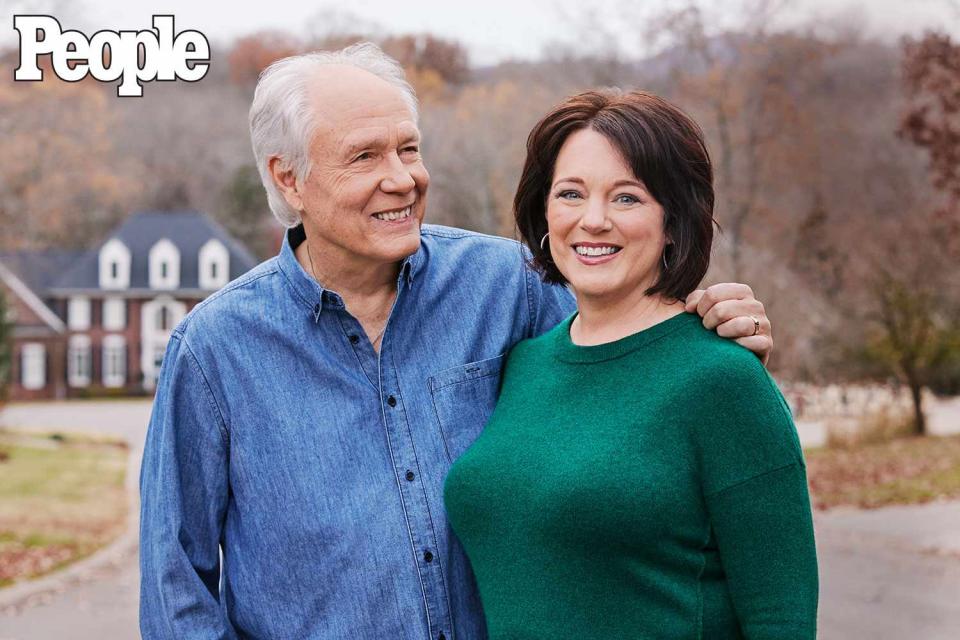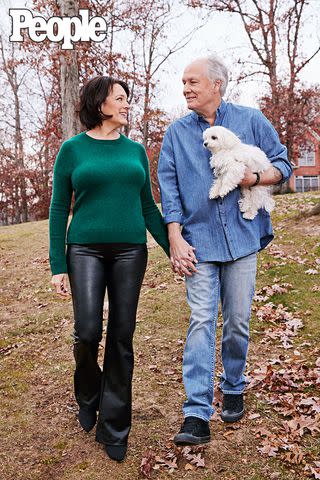After 20 Years Without Taste or Smell Due to Debilitating Condition, Rhonda Nelson Finally Has Her 'Life Back' (Exclusive)
- Oops!Something went wrong.Please try again later.
With support from her husband, Wayne Nelson of 'Little River Band,' Rhonda overcame her diagnosis of severe nasal polyps and a condition known as AERD. “It was physically and mentally draining — and scary too,” she tells PEOPLE

Diana King
Rhonda and Wayne Nelson, lead singer and bassist for the Little River Band, at home in Nashville in November 2023.Rhonda Nelson was just weeks shy of her 33rd birthday when, one night in early January 2001, she was jolted out of a sound sleep by a violent sneezing attack, a painful sinus headache and difficulty breathing.
“The sneezes were like full-body sneezes and would come every 15 to 20 seconds,” recalls her husband, Wayne Nelson, lead singer and bassist for the Little River Band. “It would go on for two or three hours, and she was just exhausted.”
Adds Rhonda: “At first I thought it was a cold, but it just persisted.”
It would be another year of searching for answers before an ear, nose and throat specialist finally diagnosed Rhonda with nasal polyps — soft, tear-shaped, usually noncancerous tissues that line the nose and sinuses in clusters, like grapes.
“I didn’t know what was triggering the attacks,” says Rhonda, who’s one of 13 million people in the U.S. who suffers from the chronic condition. “My mom had basic hay fever, and it went away, but no asthma, no polyps, nothing like that.”

Diana King
Rhonda Nelson, at home in Nashville with Sparkles, the couple's Maltese rescue. "She's the queen of the house."While polyps are generally painless, they obstruct the nasal passages, causing persistent congestion, difficulty breathing and the loss of taste and smell. “That’s a major quality-of-life [issue] and potentially even a safety concern for patients,” says Dr. Katherine Cahill, an allergist and assistant professor of medicine at Vanderbilt Medical Center, who also treats Rhonda. “It’s really unpleasant and only recently has come to the forefront as a major problem for patients.”
Treatment options include medications and/or surgery for the inflamed growths — which can return, leaving patients once again struggling to breathe and often requiring additional surgeries for relief.
“Outwardly I looked fine since I never showed symptoms during the day,” says Rhonda, 56, who’s had two surgeries since her initial diagnosis 21 years ago.
In 2002 she underwent a four-hour surgery to remove the polyps, followed by a series of allergy tests to determine the cause of her nightly sneezing attacks.
“Everything came back positive. They basically said she was allergic to everything,” recalls Wayne, whose Grammy Award-winning band is best known for ’70s rock hits like “Lonesome Loser” and “Reminiscing.” “But that didn’t really make sense.”

courtesy Rhonda and Wayne Nelson
Rhonda (with Wayne in 2022) often joins the band on their tour bus.Rhonda began receiving allergy injections, but the frequent nighttime attacks persisted. Fearing a more serious underlying problem, she and Wayne continued the frustrating search for answers. Finally in 2003, after the couple had relocated from Nashville to Flat Rock, N.C. — where they owned and managed a small inn and restaurant — a doctor diagnosed her with a condition called Samter’s Triad, also known as Aspirin Exacerbated Respiratory Disease (AERD). The three prongs of the disease are nasal polyps, asthma and allergic reactions to most pain medications, progressing to anaphylactic shock.
“The really frustrating thing for me was that not a lot of doctors were aware of AERD,” says Rhonda, who lost her sense of smell and taste for 20 years because of the condition. Thankfully, after recently switching to a new treatment, she now finds herself in a stable situation and able to enjoy life.
“I truly walked around exhausted all the time — imagine having the worst asthmatic attack you could have for three to five hours at a time,” says Rhonda, who now lives with Wayne in Nashville. “To be able to taste and smell like everybody else now is amazing. It’s awesome.”
Rhonda was born and raised in the Nashville suburb of Brentwood, where she worked for her family’s property management company and developed a deep appreciation for music. In 1999 a chance encounter at a record industry event at Nashville’s famed Wildhorse Saloon changed her life forever — when Rhonda met her future husband, musician Wayne Nelson.
“It was a very boring industry night,” recalls Wayne, now 73. “Rhonda and her three friends started dancing and having fun — and suddenly there was a party around them.”

Diana King
Rhonda and Wayne Nelson at home in Nashville, with Sparkles. "We like to have friends over and entertain a lot," says Rhonda. "That keeps us busy."Never miss a story — sign up for PEOPLE's free daily newsletter to stay up-to-date on the best of what PEOPLE has to offer, from celebrity news to compelling human interest stories.
Backstage the two connected over their shared interests and volunteer work with nonprofits and immediately hit it off. “We didn’t talk about the band or record contracts or the deals or the tours or anything. It just fit. One thing led to another,” says Wayne, who married Rhonda in October 2000 at Cheekwood Estate and Gardens in Nashville. “We were just meant to meet each other.”
A year later Rhonda’s health problems turned their world upside down. Following her first sneezing attack in 2001, the episodes soon became more frequent and intense.
“It got to be five, six times a week — almost every night,” says Wayne, recalling mornings when Rhonda couldn’t get out of bed. “A full night of sleep became a luxury.”
Within weeks Rhonda had also lost both her taste and smell. “Truly everything tasted like cardboard,” she says. “If I ate an orange, I tried to remember what an orange tastes like. And that’s kind of how I survived it.”
Even worse was not being able to smell if she was in danger from things like a natural gas leak or fire. “You think about leaving something on the stove and it burning and smoking,” says Rhonda. “Unless you’re in the kitchen, you’re not going to smell it. It sounds trivial, but it can be life-threatening.”

Scott Schrecker
Rhonda and Wayne Nelson met at an industry event in 1999 and were married (above) in Nashville in 2000.Beyond that the couple were on constant alert at restaurants or in big crowds, fearing that cigarette smoke, mold or a random fragrance might trigger an attack. While her surgery in 2002 had resolved her nasal polyps, she was still coping with chronic fatigue and tightening in the chest as a result of her AERD.
“It was physically and mentally draining — and scary too,” says Rhonda, who was running the couple’s 20-room inn in North Carolina at the time. Traveling around the country on the Little River Band’s tour bus also brought challenges. Worried that she might have a sneezing attack and disturb the band, there were times when she would sit at the front of the bus in the door well, with Wayne nearby. They were always well armed with ample amounts of hand sanitizers, wipes and inhalers — and large portable nebulizers, as well. “The first thing we’d do in a new town was scout out the nearest hospital,” says Rhonda, “in case I had an attack, and I couldn’t rebound from it.”
In the meantime Rhonda and Wayne had also been moving around the country in search of “good air for her,” says Wayne, recalling how they went from Las Vegas to Florida and later Arizona. “You might get a few months or maybe even a year of relief, but something in every environment will find a way to trigger this thing, and then it starts all over again.”
Often the doctors they saw had never heard about the disease. “It was frustrating to go to a new doctor, and they would say, ‘AERD? What are you talking about?’ ” says Wayne.
In 2011 Rhonda’s nasal polyps returned— prompting another four-hour surgery to remove the entire lining of her nasal passages. “The polyps had started to attach to the bone,” she says, “so they had to scrape all that out.” (Prior to surgery her doctor offered Wayne a glimpse of her polyps on a screen following a nasal scope. “I just started crying to know that she had been dealing with that for so long.”)
During Rhonda’s four-week recovery, as her nasal passages healed, she wasn’t allowed to bend over or lift anything. She also permanently lost the function of her cilia — small hair-like structures in the nose that help keep the nasal passages clear. Sinus infections are a common side effect of the surgery, and Rhonda has had to use a medicinal nasal rinse twice a day ever since to prevent them.

Diana King/people
Rhonda Nelson and her rescue Maltese, Sparkles.Thankfully, with help from medications and a range of self-care practices such as acupuncture, yoga, red-light therapy and an at-home infrared sauna, Rhonda’s life has dramatically improved since then. She has suffered setbacks along the way — one drug caused such severe joint pain, she was forced to use a cane — but she’s optimistic about her future. In 2020 she regained her sense of taste and smell, ironically, after getting COVID. “I was the opposite of everybody else,” she says. “It was actually overpowering [for a while]. Things were literally making me a bit nauseous because I hadn’t smelled in so long.”
These days she’s back to savoring the rich and complex flavors at the Thai and Indian restaurants she frequents with her husband and welcoming friends to their Nashville house for a home-cooked meal. With the Little River Band on the road 45 weekends a year— and performing up to 90 shows annually—Rhonda often joins Wayne on tour, looking up friends around the country.
“We’re weekend warriors,” says Wayne. “We leave on Wednesday or Thursday and come back on Sunday or Monday.” (Rhonda chronicled her experiences on the road with Wayne and the band in her 2016 book A Different Life.) She has also devoted considerable time to volunteering for animal rescues and foster care agencies, and she’s served on the executive board of the Allergy and Asthma Network since 2021.
“We’ve dealt with so many issues, but that’s finally starting to lift,” says Wayne. Adds Rhonda: “My heart breaks for the people who still haven’t found the right diagnosis or the right drugs that work for them. I feel so grateful.”
PEOPLE Health can be found in select doctors' offices across the U.S. For more celebrity updates and the latest health news, pick up the latest issue of PEOPLE on newsstands or subscribe here.
For more People news, make sure to sign up for our newsletter!
Read the original article on People.

